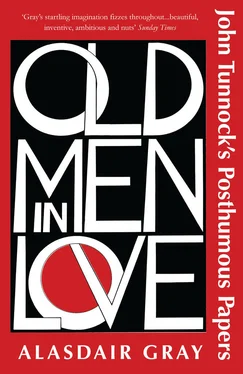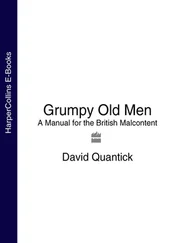Alasdair Gray
Old Men in Love
One beginning and ending for a book was a thing I did not agree with. A good book may have three openings entirely dissimilar and interrelated only in the prescience of the author, or for that matter one hundred times as many endings.
— At Swim-Two-Birds by Flann O’Brien







LADY SARA SIM-JAEGAR’S INTRODUCTION
We Sim-Jaegars are a widely scattered clan. Though born and educated in England I am now resident in Los Angeles with all the rights of a United States citizen. The Edinburgh Festival has twice drawn me to Scotland, yet I never dreamed I had a distant cousin there until a solicitor’s letter arrived “out of the blue,” as they say. It told me John Tunnock had died intestate, that I was his next of kin, and asked how I wished to dispose of his estate — some thousands of pounds in a savings account and a large terrace house in Glasgow’s Hillhead district. The current sale price of such houses was anything between half a million and a million. Furnishings, domestic appliances, ornaments, pictures and books had not yet been professionally valued, but a Glasgow agent of Christie’s (the well-known auctioneering firm) had written expressing interest in a stained glass panel representing Faith, Hope and Charity in the stairwell window, since records of the William Morris workshop indicated that it was designed by Burne-Jones. If I wished to view my cousin’s former property without residing in it (which was perhaps likely, given the circumstances of his death) I would easily find accommodation in a neighbourhood Hilton hotel.
This letter had clipped to it a Herald newspaper cutting dated three weeks earlier. It said that John Tunnock, retired schoolteacher, aged sixty-seven, had been found dead at his home in Glasgow’s Hillhead district, and the police were appealing to the public for information about anyone seen entering or leaving his home before the morning of Saturday, 28 thApril. Attached to the clipping was a further note from the lawyer saying the police had taken all evidence the house could yield and no arrests would be made. He had ordered the removal of blood stains and the place was now thoroughly tidied and cleaned, all locks on doors were changed and a new up-to-date burglar alarm installed. He awaited my instructions.
Well! God knows I have all the money I need but a businesswoman can always use more. My investments are safe because I work closely with my brokers and lawyers — not that I suspect them of corrupt practices, but when professional men’s judgement is at fault (and no financial arrangement is ever flawless) they sometimes automatically ensure that the cost is borne by inattentive clients. This canny attitude brought me to Glasgow against the advice of American and English friends who said I would be in danger of criminal violence, and pointed to my cousin’s fate as a warning. My omniscient insurance advisor disagreed. Glasgow, he said, certainly had the greatest density of European poverty, ill health and crime west of the former Communist empire — in one district the average life expectancy was seventeen years less than that of those living in the Gaza Strip before the recent Israeli-Lebanese war — but the murder rate was still three quarters of that in most United States cities. Statistics show that in Glasgow’s Hillhead area a woman is marginally safer than in Beverly Hills, especially if she does not wear bright blues or greens while watching television football in crowded pubs. These colours, that sport, such pubs do not tempt me. To Glasgow I came.
Next morning at the Hilton hotel I had a business breakfast with the solicitor, Alasdair Gillies. He could tell me nothing directly about my cousin, never having met him. Legal documents in the possession of his firm, letters in the Tunnock family home had enabled him to trace me through a distant relation who had emigrated in Victoria’s reign. They had also revealed a family secret. John’s mother Griselda was youngest daughter of Murdo Henderland Tunnock, for many years minister of Hillhead Parish Church. Like her two sisters she never married. Unlike them she had left the family home, first becoming a typist in a local tax office before promotion in 1936 to a superior post in London. Four years later at the age of forty-one she gave birth to John, her first and last child. The birth certificate gives a line of unpronounceable consonants as the father’s name, gives his occupation as Polish naval officer, which seems improbable. Griselda brought her baby to Glasgow a week later, deposited him with her sisters (whose parents were dead) and returned to London. Soon after she too died, crushed by a falling wall while cycling to work after a night of heavy bombing by the Luftwaffe.
John’s subsequent life with his aunts seems to have been unusually cloistered. He attended Hillhead Secondary then the University of Glasgow, both near each other and less than ten minutes walk from the family home. He trained as a teacher at Jordanhill College, a short bus ride to the west, after that becoming a teacher, then headmaster of Molendinar Primary School in Robroyston, a longer ride to the east. He never owned a car. Mr Gillies suggested that his aunts “kept him on a very short leash”. They were his housekeepers until 1977 when he took early retirement to look after them, helped by house cleaners and visiting nurses. Before then he had holidayed with them in hilly or coastal parts of Scotland. The last aunt died aged ninety-seven in 1998, after which he seems never to have slept outside the family home. On week days his social life was mainly evening visits to Tennants, a pub at a corner of Byres Road where the usual clients were students, academics, several long-term unemployed and a few owners of small businesses who avoided declaring their earnings to the Inland Revenue. Here John was well known though his quiet ways drew very little attention. His main acquaintance was Francis Lambert, a retired university lecturer and more robust figure with whom John Tunnock gossiped and discussed crossword puzzles. On Saturdays and Sundays John walked briskly to pubs elsewhere, some in the city centre or south of the river or further east, seldom drinking more than a half pint of lager in each, and stopping at cafés for cups of tea or snacks. His visits to these places were not exactly predictable, but regular enough for people he met to assume he lived locally, though most of the pubs were over a mile apart. None of those he talked to thought him interesting or unusual before they heard of his death.
I brooded on this information, then asked if any of these pubs showed football matches on television? Had John worn noticeable colours? Mr Gillies understood more by my question than I knew it contained. The police had investigated that (he said) and found John Tunnock never wore team colours, supported neither Rangers nor Celtic, was neither Orangeman nor Fenian, Mason or Knight of Saint Columba. When asked what football club he supported Tunnock always said Partick Thistle, which in Glasgow is a code name for agnostic and might inspire contempt in Protestant or Catholic bigots but not murderous rage.
Читать дальше

















